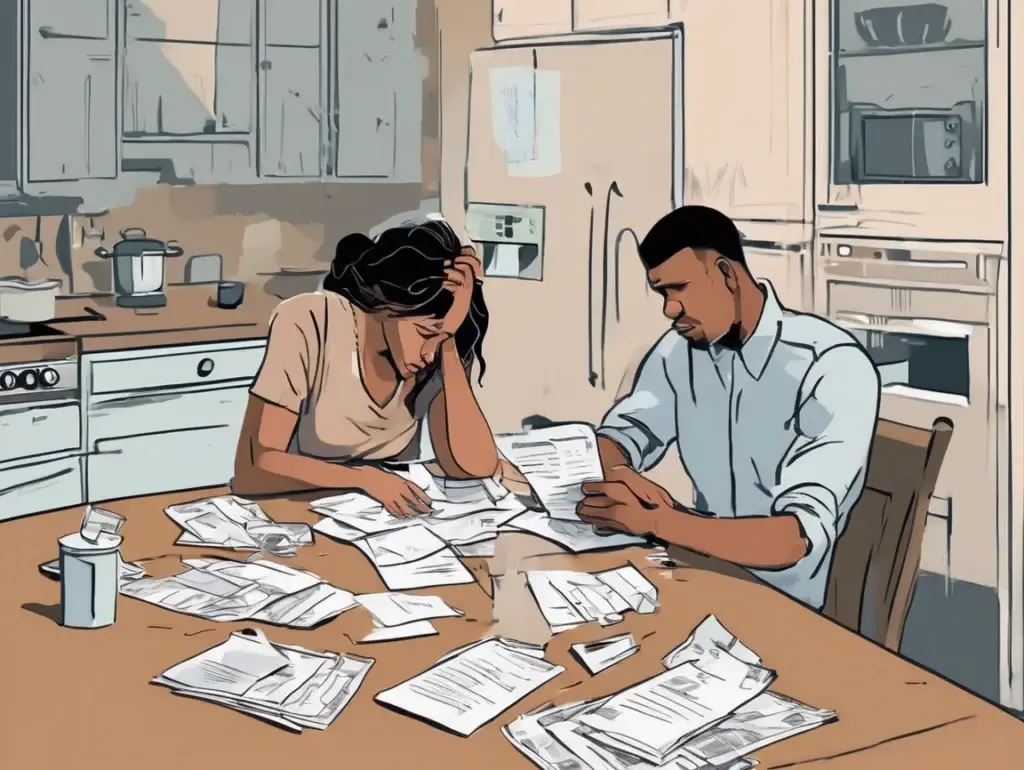In times of economic uncertainty, conversations often revolve around job losses, market crashes, inflation, and interest rates. But there’s another victim of recession that doesn’t make headlines nearly enough—our relationships. Whether it’s between romantic partners, friends, or family members, financial instability can act as a silent toxin, slowly eroding trust, patience, and emotional connection.
This post explores how recessions put strain on relationships and offers actionable insights to help couples and families weather the storm together, not apart.
The Invisible Weight of Financial Stress
Money is one of the leading causes of stress in relationships—and during a recession, that stress can go from simmer to boil. Layoffs, shrinking savings, and rising costs of living can cause fear, uncertainty, and a loss of control. When couples or families face these issues, they often begin to turn on each other rather than turning to each other.
Common Financial Stressors:
- Job Loss or Reduced Income: One partner losing a job can shift the entire dynamic of a relationship, especially if the other is not in a position to make up the shortfall.
- Debt and Credit Pressure: With limited income, credit cards or loans often become the fallback—bringing interest and anxiety with them.
- Lifestyle Downgrades: Couples used to dining out, traveling, or maintaining a certain standard of living may find themselves scaling back, which can feel like failure or loss.
- Financial Inequality: If one partner earns significantly more than the other, that imbalance can suddenly feel more pronounced and lead to resentment.
The Emotional Fallout: Anxiety, Shame, and Isolation
Recession-induced financial stress rarely remains confined to bank statements. It creeps into emotional wellbeing and communication patterns.
- Shame: One or both partners may feel like they’re failing—especially if traditional gender roles, upbringing, or personal identity are tied to financial contribution.
- Anxiety and Depression: Worrying about bills or the future can spiral into mental health challenges that affect how we show up in our relationships.
- Communication Breakdown: When people are overwhelmed or ashamed, they’re more likely to shut down or lash out. This causes distance between partners instead of the collaboration needed during hard times.
- Loss of Intimacy: Emotional and physical intimacy often suffer. Stress dampens libido, lowers mood, and can create a sense of disconnect or rejection.
- Power Struggles: The recession might expose cracks in shared values or decision-making approaches. One partner may become more risk-averse, while the other still wants to spend or invest—leading to friction.
Strains on Parenting and Family Dynamics
It’s not just romantic partnerships that are affected. Families as a whole feel the impact of a recession.
- Children Feel the Tension: Even if parents try to shield their kids from financial discussions, children are incredibly perceptive. They may notice fewer gifts, increased arguments, or changes in routines.
- Co-parenting Conflicts: Financial tension can lead to disagreements about how to prioritize children’s needs—school, clothing, activities, and even basic necessities.
- Generational Stress: In multigenerational households, elder care, college funding, or adult children moving back home can intensify stress and test boundaries.
- Blame Culture: Family members may start blaming each other for not saving enough or for previous financial decisions that feel reckless in hindsight.
Recession and Divorce Rates: What the Research Shows
The link between recessions and divorce rates is complicated.
During the Great Recession (2007–2009), divorce rates initially declined—not because couples were happier, but because they couldn’t afford to separate. Legal fees, maintaining two homes, and childcare often made staying together a financial necessity.
But as the economy slowly recovered, divorce rates surged. Couples who had been “waiting out” the recession found themselves emotionally depleted, and once they had the means, they made the split official.
This pattern underscores a harsh reality: recession might delay a breakup, but it doesn’t always prevent one.
The Mental Load on Women and Caregivers
In heterosexual relationships, women often bear the emotional and logistical labor of managing stress in the household. This includes balancing budgets, maintaining routines, emotional regulation for kids, and even providing emotional support for their partners.
During a recession, this load becomes heavier:
- Women may leave the workforce to cut childcare costs.
- Emotional burnout becomes a real risk.
- Feelings of underappreciation or being taken for granted can grow.
If left unchecked, this imbalance can lead to long-term resentment and burnout, ultimately weakening the relationship.
How to Protect Your Relationship During a Recession
It’s not all doom and gloom. Recession can be a catalyst for building stronger communication, creating new habits, and building resilience—as long as couples and families are willing to face the challenge together.
Here are some strategies to strengthen relationships in tough economic times:
1. Practice Radical Financial Transparency
Avoid secrets, silent blame, or assumptions. Sit down and talk openly about:
- What’s in the bank
- What debts exist
- What’s causing the most financial anxiety
Creating a shared financial plan—even if it’s just surviving the next few months—can transform fear into teamwork.
2. Redefine Roles Together
If one person loses a job, redefine how each partner contributes. Emotional support, childrearing, cooking, and job hunting are all valid ways to carry weight in a partnership.
The key is not letting money be the only measure of value.
3. Reignite Emotional Intimacy
It doesn’t take money to build intimacy:
- Take daily walks together
- Write love notes
- Schedule “unplugged” time to talk without distractions
Recession might take away luxury, but it can’t take away connection—unless you let it.
4. Find Humor and Gratitude
Laugh together. Celebrate the small wins. Gratitude is one of the most powerful tools for navigating adversity. Make a list of things you’re thankful for—each other included.
5. Limit Doomscrolling
Constant exposure to negative news and economic predictions can create a “sky is falling” mentality. Set boundaries around media consumption and focus on your own household’s controllables.
6. Get Professional Help (Financial or Emotional)
If you’re overwhelmed, bring in help:
- Financial advisors or nonprofit credit counselors can help make a plan.
- Therapists or relationship coaches can offer strategies to reconnect emotionally. Many offer sliding scale options, and some employers still offer EAPs (employee assistance programs) even during layoffs.
7. Set Micro-Goals
Instead of stressing over long-term uncertainty, focus on short-term wins:
- Saving $50 a week
- Applying to 10 jobs per month
- Cooking at home 3 nights a week
- Having one “state of the union” talk each weekend
Small wins can reestablish momentum and restore confidence in each other.
Resilience Through Recession: Stories of Strength
While many couples break under financial strain, others use these times to come out even stronger.
Some partners discover how well they problem-solve together. Others find new shared values—simplicity, community, or mutual support. Children raised in households that face adversity with love and resilience often grow up with a deeper sense of gratitude and emotional intelligence.
There’s no denying that recession hurts—but it also reveals. It shows us the cracks in our systems and relationships. But it also shows us where the strength is.
Final Thoughts: Choose “We” Over “Me”
When financial hardship strikes, the natural instinct is to protect oneself. But relationships require the opposite—choosing we over me, even when times are tough.
If you’re in a relationship facing the pressures of a recession, remember:
- You’re not alone.
- Your partner is not the enemy.
- Stress is temporary, but love and commitment are long games.
No economic downturn lasts forever—but what you do during the hardest times can define your relationship forever. Choose grace. Choose honesty. Choose each other.

